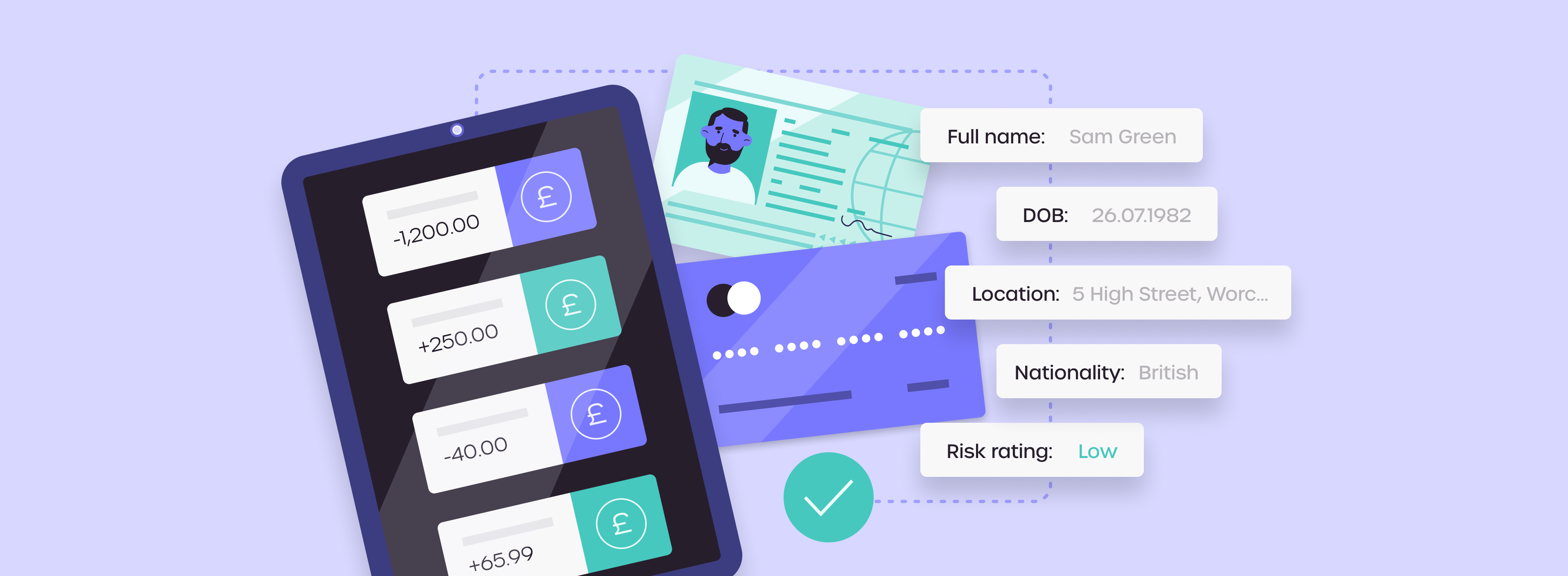
5 ways GBG Identity Score helps know your customer
The exponential growth in digital services and online accounts is evident everywhere. For organisations and individuals, digital channels are primary; our location limits us less as our range of customers and suppliers grows internationally.
As the extent and diversity of our internet activity have increased, everyone relies more on digital identity; a recent survey found the average number of passwords we each have increased by 25% during the global pandemic. New verification technologies and different cultural and legal practices have directed our endlessly varied digital journeys and left a complex data footprint behind every citizen and consumer.
“Despite the diversity of identity reference data and identity documents that now exist in the world, customer due diligence requirements are failing to keep up.”
KYC 2+2 compliance
Using a risk-based approach to customer due diligence, it’s necessary to check multiple sources to reach an appropriate level of trust. Regulatory requirements offer some guidance, but tend not to be prescriptive, putting the onus on business to take appropriate steps to stay on the right side of compliance.
A common KYC (know your customer) calculation is 2+2. This compliance sum requires a minimum of two customer identity attributes (name, address or date of birth) to match two different data sources, such as a credit reference or national identity register, to achieve a positive result. Simple enough. The trouble is, if a digital identity footprint doesn’t perfectly fit the equation, it won’t pass.
“An identity score similar to a credit score”
There is a strong appetite among businesses for a consistent global identity score (like a credit score) that offers a simple, consistent and objective metric for measuring confidence in digital identity. Seventy-nine per cent of compliance professionals we spoke to across Australia, France, Germany, Spain, the UK and the USA expressed interest in “an identity score similar to a credit score.”
Global State of Digital Identity Report 2023

This presents a challenge to any business looking to capitalise on digital freedoms in new markets. Compliance managers we spoke to for our Global State of Digital Identity Report 2023 told us KYC definitions don't describe contemporary digital consumers. They are ‘too binary’, they ‘exclude good customers’, fail to exploit the ‘data diversity’ we have and remain ‘focussed on checks’ rather than expanding our understanding of digital identities.
“GBG Identity Score provides a globally consistent metric from 0 to 1000 that tells you in real time how much trust you should place in a digital identity.”
GBG Identity Score
GBG Identity Score offers a more precise understanding of digital identity. By calculating identity match accuracy, match integrity and match count across a prospective customer’s complete digital footprint and generating a score from 0 to 1000.
The calculation can use all available data, including data typically omitted from standard KYC checks, like mobile number or email address, assessing the accuracy and integrity of each match and determining a more accurate confidence score. For example,
- Source 1 delivers partial forename, surname, date of birth and address match
- Source 2 delivers forename, surname, address and mobile number match
- Source 3 delivers forename, surname and date of birth match
While these matches may not add up to a 2+2 pass, a precise understanding of a digital identity will indicate whether it’s likely to be genuine. A good GBG Identity Score for an identity that has failed KYC will indicate that further checks are likely to lead to successful onboarding, helping your business maximise the value of downstream KYC costs.
How GBG Identity Score adds up
GBG Identity Score provides a globally consistent metric from 0 to 1000 that tells you in real time how much trust you should place in a digital identity.

Identity match accuracy
It measures the precise degree of accuracy or fuzziness to which identity data fields match and the relative importance of each field.
Identity match integrity
It also assesses the pedigree of a diverse range of data sources where the identity appears, calculating the level of integrity.
Identity match count
Finally, it counts the total number of matches discovered in these datasets to complete the calculation and deliver a score from 0 to 1000.
How much can you trust a digital identity?

5 ways GBG Identity Score helps know your customer

Onboard more thin-file customers
Data-led KYC checks tend to over-rely on credit bureau data and consequently overlook thin-file customers who hold few accounts. This ‘make the consumer fit the compliance approach’ can often result in false fails, especially for younger prospects who could become lifelong customers for the company that will welcome them onboard.
GBG Identity Score takes a more holistic view of a prospective customer’s digital footprint. By analysing the identity integrity, count and accuracy across a wider range of data sources, it’s possible to establish a greater level of trust in the next generation of consumers and be confident that identity document checks, for example, will lead to customer onboarding.

Increase KYC return on investment
Directing effective investment in optimising customer onboarding journeys is a common concern among compliance teams. Brands need to see a return on investment for KYC, avoiding excessive costs on identity verification that won’t bring in any new business.
“GBG Identity Score helps focus investment on KYC checks on those customers who have a reasonable chance of passing.”
GBG Identity Score helps focus investment on KYC checks on those customers who have a reasonable chance of passing. If a prospect fails KYC on the first attempt and the GBG Identity Score indicates low or no confidence in that identity, it’s unlikely that further checks will be cost-effective. Conversely, purchasing one extra check or proceeding to identity document verification and authentication for an identity that delivers a medium score could well result in a pass, a new customer and improved KYC ROI.
Compare your onboarding results
Comparing the average GBG Identity Score achieved by new customers to your business to the anonymised average scores achieved by your industry peers can be revealing.
Say, for example, you’re targeting wealth management services at high-net-worth customers; this demographic will typically have a well-developed digital identity footprint. A low average score compared to your industry may be a sign that your KYC at onboarding is not optimised. Are you using the best data sources for your target audience and market? Are you using all the data sources available to your business in that market?
By adjusting your identity data sources you can increase your GBG Identity Score, KYC pass rate and customer onboarding rate. For a business selling high-value products, even a small percentage increase in these metrics can mean a large return on investment.
Compare your onboarding results to your industry


Optimise onboarding by country
Optimising onboarding strategies in international markets while managing regulation and risk cost-effectively can seem a remote possibility for many compliance teams.
Our International Identity Index uses GBG Identity Score to calculate the maximum attainable score for any individual in that country and the percentage of the population that could achieve it. It’s a guide to the state of national identity verification ecosystems and comes complete with a recommendation for data or document verification in-market, and in the case of data, how many sources are required to achieve that maximum score.
Armed with these actionable insights, your business can determine the most effective onboarding journeys country by country, tailoring the experience for the best, most cost-effective identity verification around the world.

Reward high-scoring identities
Trust is valuable and trusted, valued customers will always welcome recognition of their special status and importance to your business.
Just as a high credit score confers standing and access to better deals, an above-average GBG Identity Score could be an indicator of someone worthy of VIP treatment. A customer identity that measures high on this confidence scale, when properly authenticated, presents a low risk to your business and potentially a long and mutually beneficial business relationship.
This trusted status could be used to fast track a new customer through some fraud checks, skip document checks, or even target rewards. Rewards might include a more attractive welcome bonus or could take the form of ongoing offers, preferential terms or access to additional services that will return increased customer loyalty and longevity.
Frequently Asked Questions
What is GBG Identity Score?
GBG Identity Score is an identity confidence metric from 0 to 1000. It offers a more precise understanding of digital identity than standard pass-fail KYC checks by calculating the identity match accuracy, match integrity and match count achieved by a prospect taking your business onboarding journey.
What is know your customer?
Know your customer (KYC) is a client verification requirement for regulated industries. It refers to the customer due diligence companies must carry out at onboarding to ensure customers are who they say they are and do not pose a money laundering or fraud risk to the business.
Can GBG Identity Score replace standard KYC checks?
GBG Identity Score complements your current risk-based approach to customer due diligence. By offering a precise measure of identity confidence, Score helps to optimise onboarding journeys for individuals and target downstream KYC costs, including document checks.
How can I start using GBG Identity Score?
GBG Identity Score is free to customers of our global portfolio of identity verification and fraud prevention solutions. Contact our team of identity experts to find out more.
Dial up the trust
Contact our team of identity experts to find out how GBG Identity Score can help your business measure confidence, dialling up trust in digital identity worldwide.




